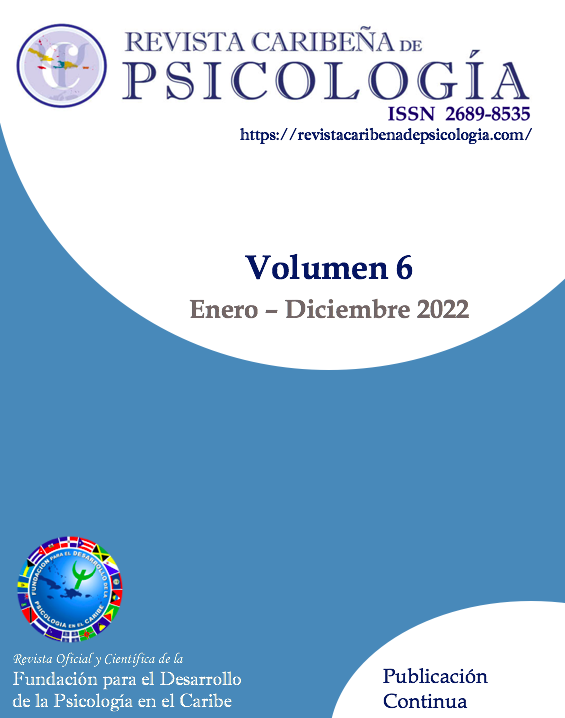Diferencias entre Funcionamiento Ejecutivo en Pruebas Psicométricas y Autoevaluaciones en una Muestra de Jóvenes Puertorriqueños
DOI:
https://doi.org/10.37226/rcp.v6i1.6471Palabras clave:
funcionamiento ejecutivo, pruebas psicométricas, autoevaluacionesResumen
La tasa de deserción escolar en jóvenes puertorriqueños pudiera estar mediada por dificultades en el funcionamiento ejecutivo (FE). Estas dificultades pudieran estar relacionadas a auto-metarepresentaciones inexactas de FE. Las metarepresentaciones de FE pueden evaluarse mediante autoreportes completados por los jóvenes. Pocas investigaciones han examinado la relación entre las metarepresentaciones de FE y el FE desempeñado en pruebas psicométricas de ejecución. El propósito de este estudio es examinar las diferencias entre el FE desempeñado en pruebas psicométricas de ejecución y el FE autoevaluado en una muestra de jóvenes puertorriqueños en edades de 12 a 18 años. Se utilizó un diseño transversal-descriptivo de muestras-pareadas intrasujetos. Participaron 30 jóvenes quienes completaron el Cognitive Assessment System-2 Español (CAS-2: ES) como medida de FE en pruebas psicométricas de ejecución y el Comprehensive Executive Function Inventory (CEFI) como medida del FE autoevaluado. Los resultados la prueba t de muestras-pareadas intrasujetos resultó significativa t(29) = -3.54, p < .001 (CAS-2: ES M = 91.63, DE = 11.75, rango 71-114; CEFI M = 104.50, DE = 12.71, rango 86-135) con un tamaño del efecto moderado (d = .65). Los resultados sugieren que la muestra del estudio tiende a sobrevalorar su FE. Esta auto-sobrevaloración pudiera dificultar la evaluación certera del FE. Es imperativo adoptar un acercamiento combinado de evaluación que incluya medidas de FE en pruebas psicométricas de ejecución y de FE autoevaluado para tener una visión representativa del FE, desarrollar intervenciones precisas que promuevan el desarrollo de FE y así prevenir la deserción escolar en Puerto Rico.
Citas
Aron, A., Aron, E. N., & Coups, E. J. (2013). Statistics for psychology (6th ed.). Pearson Education.
Best, J. R., Miller, P. H., & Naglieri, J. A. (2011). Relations Between executive function and Academic Achievement from Ages 5 to 17 in a large, representative nation sample. Learning and In-dividual Differences, 21(1), 327-336. https://doi.org/10.1016/j.lindif.2011.01.007
Buchanan, T. (2016). Self-report measures of executive function problems correlate with personality, not performance-based executive function measures, in nonclinical samples. Psycho-logical Assessment, 28(4), 372–385. https://doi.org/10.1037/pas0000192
Chan, T., & Martinussen, R. (2016). Positive illusions? The accu-racy of academic self-appraisals in adolescents with ADHD. Journal of Pediatric Psychology, 41(7), 799-809. https://doi.org/10.1093/jpepsy/jsv116
Cohen, J. (1988). Statistical Power Analysis for the Behavioral Sciences (2nd ed.). Lawrence Erlbaum Associates. http://www.utstat.toronto.edu/~brunner/oldclass/378f16/readings/CohenPower.pdf
Cordero-Arroyo, G., González-González, M., Bermonti-Pérez, M., & Moreno-Torres, M. A. (2018). Intervención neuropsicológi-ca para estudiantes con inatención, hiperactividad y difi-cultades en lectura. Revista Puertorriqueña de Psicología, 29(2), 254-268. https://repsasppr.net/index.php/reps/article/view/427
Das, J. P., Naglieri, J. A., & Kirby, J. R. (1994). Assessment of cogni-tive processes: The PASS theory of intelligence. Allyn and Bacon.
Devine, R. T., & Hughes, C. (2014). Relations between false belief understanding and executive function in early childhood: A Meta-Analysis. Child Development, 85(5), 1777-1794. https://doi.org/10.1111/cdev.12237
Goldstein, S. y Naglieri, J. (2014). Handbook of Executive Functioning. Springer.
Gonzales, C. R., Fabricius, W. V., & Kupfer, A. S. (2018). Intro-spection plays an early role in children’s explicit theory of mind development. Child Development, 89(5), 1545-1552. https://doi.org/10.1111/cdev.12876
Howitt, D., & Cramer, D. (2014). Introduction for Research Methods in Psychology (4th Ed.) Pearson.
Hughes, C., y Ensor, R. (2011). Individual differences in growth in executive function across the transition to school predict externalizing and internalizing behaviors and self-perceived academic success at 6 years of age. Journal of Experimental Child Psychology, 108(3), 663–676. https://doi.org/10.1016/j.jecp.2010.06.005
Jiwon-Na, J., & Mikami, A. Y. (2018). Pre-existing perceptions of ADHD predict children’s sociometrics given to classmates with ADHD. Journal of Child and Familiy Studies, 27(1), 3218-3231. https://doi.org/10.1007/s10826-018-1147-8
Kroesbergen, E. H. Van Luit, J. E., Naglieri, J. A., Taddei, S., & Franchi, E. (2010). PASS processes and early mathematics skills in Dutch and Italian kindergarteners. Journal of Psy-choeducational Assessment, 28(6), 585-593. https://doi.org/10.1177%2F0734282909356054
McKeague, L., Hennessy, E., O’Driscoll, C., & Heary, C. (2015). Retrospective accounts of self-stigma experienced by young people with attention-deficit/hyperactivity disorder (ADHD) or depression. Psychiatric Rehabilitation Journal, 38(2) 158-163. https://doi.org/10.1037/prj0000121
McQuade, J. D., Tomb, M., Hoza, B., Waschbusch, D. A., Hurt, E. A., & Vaughn, A. J. (2011). Cognitive deficits and positively biased self-perceptions in children with ADHD. Journal of Ab-normal Child Psychology, 39(2), 307–319. https://doi.org/10.1007/s10802-010-9453-7
Medina, N. G. (2018). Cognitive modification in students with reading problems and ADHD-CT. Revista Puertorriqueña de Psicología, 29(2), 302-315. https://www.repsasppr.net/index.php/reps/article/view/433
Rosario-Hernández, E., & Rovira Millán, L.V. (2002). Desarrollo y validación de una escala para medir las actitudes hacia el reti-ro. Revista Puertorriqueña de Psicología, 13(1), 45-60. https://repsasppr.net/index.php/reps/article/view/113
Moreno-Torres, M. A., Diaz-Flores, W., Bermonti-Perez, M., & Rodriguez-Arocho, W. (2018). Comparación de Perfiles del TDAH-TC en la EIWN-R-PR y el CAS. Revista Puertorriqueña de Psicología, 29(2), 224-237. https://www.repsasppr.net/index.php/reps/article/view/438
Moreno-Torres, M. A., Ortiz-Ortiz, Y., & González- González, M. (2016). Capacitación de docentes en procesos neurocognitivos para atender la deserción escolar asociada a aprovechamiento académico. Revista Puertorriqueña de Psicología, 27(2), 304-318. https://repsasppr.net/index.php/reps/article/view/293/294
Moreno-Torres, M. A., & Torres, G. (2020). Relación entre funciona-miento ejecutivo y control glicémico en jóvenes con Diabetes Tipo I [Doctoral dissertation]. Ponce Health Sciences University, Puerto Rico.
Naglieri, J. A., & Goldstein, S. (2013). Comprehensive Executive Func-tion Inventory (CEFI) Technical Manual. Multi-Health Systems.
Naglieri, J. A., Das, J. P., & Goldstein, S. (2014). Cognitive Assess-ment System Second Edition (CAS) Technical Manual. Pro.ed.
Naglieri, J. A., Moreno, M. A., & Otero, T. M. (2017). Cognitive Assessment System-2: Español, manual de administración y califi-cación. Pro-Ed.
Nordvall, O., Jonsson, B., & Neely, A. S. (2016). Self-reported and performance-based measures of executive functions in in-terned youth. Psychology, Crime & Law, 23(3), 240–253. https://doi.org/10.1080/1068316X.2016.1239725
Pineda‐Alhucema, W., Aristizabal, E., Escudero‐Cabarcas, J., Acosta‐ Lopez, J. E., & Velez, J. I. (2018). Executive function and theory of mind in children with ADHD: A systematic re-view. Neuropsychology Review, 28, 341–358. https://doi.org/10.1007/s11065-018-9381-9
Rothlind, J., Dukarm, P., & Kraybill, M. (2017). Assessment of self-awareness of cognitive function: Correlations of self-ratings with actual performance ranks for tests of processing speed, memory and executive function in non-clinical samples. Ar-chives of Clinical Neuropsychology, 32(3), 316–327. https://doi.org/10.1093/arclin/acw109
Sáez-Pagán, Y. (2015) Analysis of the Relationship Between Executive Function Behavioral Manifestations and Cognitive Processes of Children Between 5 and 6 years of age. [Doctoral Thesis]. Ponce Health Sciences University, Puerto Rico.
Salkind, N. J. (2010). Encyclopedia of Research Design. SAGE.
Stone, C. A., & May, A. L. (2002). The accuracy of academic self-evaluations in adolescents with learning disabilities. Journal of Learning Disabilities, 35, 370-383. https://doi.org/10.1177/00222194020350040801
National Academy of Sciences. (2019). Reproducibility and Replica-bility. The National Academies Press.
Traub Bar-Ilan, R., Cohen, N., & Maeir, A. (2018). Comparison of children with and without ADHD on a new pictorial self- as-sessment of executive functions. American Journal of Occupa-tional Therapy, 72, 7203205040p1. https://doi.org/10.5014/ajot.2018.021485
Váras-Diaz, N., Santos-Figueroa, A., Polanco-Frontera, N. & Caji-gas-Vargas, I. (2012). Desarrollo de una Escala para Medir el Estigma Relacionado a Problemas de Salud Mental en Puerto Rico. Revista Puertorriqueña de Psicología, 23(1), 107-117. https://repsasppr.net/index.php/reps/article/view/211
Wade, M., Prime, H., Jenkins, J. M., Yeates, K. O., Williams, T., & Lee, K. (2018). On the relation between theory of mind and executive functioning: A developmental cognitive neurosci-ence perspective. Psychonomic Bulletin & Review, 25(6), 2119–2140. https://doi.org/10.3758/s13423-018-1459-0
Descargas
Publicado
Cómo citar
Número
Sección
Licencia
Derechos de autor 2022 Nicole E. Ruiz-Raíces, Rosanna Rodríguez, Christian E. De León Casillas, Vanessa Ortiz Rosado, Mary Annette Moreno-Torres

Esta obra está bajo una licencia internacional Creative Commons Atribución 4.0.







